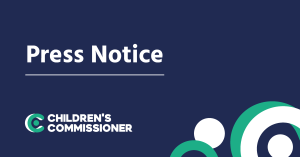- Stark new data reveals 775 children, some as young as two, living in illegal children’s homes – including holiday camps, activity centres, caravans and AirBnBs
- Private companies putting exorbitant profits over children’s care and wellbeing, with an estimated annual cost to the taxpayer of more than £439 million
- Average daily costs equate to £1,600 per child, with 33 children in placements each costing more than £1 million
The Children’s Commissioner is calling for immediate action to stop hundreds of children from being housed illegally in settings including caravans and holiday rentals, at exorbitant cost to local authorities.
Stark new data gathered under the Children’s Commissioner’s statutory powers will shed light on the alarming rise in illegal children’s homes. It reveals that on a single day this year (1 September), 775 children – many extremely vulnerable or with complex needs – were housed illegally by local authorities in England at a cost to the taxpayer of nearly £440 million.
The data, to be published on Monday 16th December, will demonstrate for the first time the national picture in England of how local authorities are accommodating these children – some of whom are nursery age, as young as two.
It underscores the crisis in children’s social care, with children put in extremely high cost and poor quality placements – and makes clear the urgent need for reform to make sure every child receives appropriate care in a safe, supportive environment.
Currently there is no process for checking the quality of care children in illegal homes receive, or the suitability of the adults providing the care – because, by law, these placements should not exist in this form. They should be in registered children’s homes or foster homes overseen and inspected by Ofsted.
Children’s Commissioner for England Dame Rachel de Souza said:
“This is a national scandal. Every night across England hundreds of children are going to sleep in illegal ‘homes’, where they are often isolated and left without appropriate care. As Children’s Commissioner, I am deeply alarmed by the widespread and increasing use of illegal children’s homes across England by local authorities, where hundreds of children, if not more, are being placed.
“My research finds that on one single day this year, nearly 800 children were placed in wholly unsuitable accommodation, with private organisations using such locations as holiday camps, activity centres, AirBnBs and even caravans to house very young children. And this could be just the tip of the iceberg over the course of a year.
“Vulnerable children are being failed – this should never be allowed. If we wouldn’t allow it for our own children, we cannot allow it to happen to the children for whom the state is their corporate parent.”
The Commissioner’s report will be published just ahead of the Government’s Children’s Wellbeing Bill being introduced to Parliament, which will set out a series of significant reforms to tackle the historic neglect of children’s social care.
Dame Rachel de Souza said:
“The introduction of the Children’s Wellbeing Bill is a vital step forward and gives us the opportunity to clamp down on private providers and inappropriate placements. But it needs to go further and faster – and to be far tougher on those who put profits above protecting children, so that every child goes to bed at night safe, well and surrounded by people who care for them.”
Statistics published by Ofsted show the number of reports of illegal, or unregistered, homes has dramatically increased from 144 in 2020-21 to 931 in the year to March 2024.
The Commissioner’s own Help at Hand advice and support service has stepped in to help many children in precarious living arrangements. These children are often highly vulnerable with complex needs or disabilities.
The findings in the report will demonstrate some of the most extreme interventions the state can make in children’s social care. Almost a third (31%) of children in illegal homes were subject to a court-ordered Deprivation of Liberty order.
The Commissioner’s report will also show that children face huge variation in the length of time spent in illegal homes, with many left in placements for over a year. The average was more than six months (185 days) but there were some extremes, including:
- One 28-day crisis intervention placement lasting nearly 300 days;
- One teenager, on a Deprivation of Liberty order, placed in a caravan for more than two months.
In her report, the Children’s Commissioner has set out a series of recommendations:
- Ensuring every child in care who has experienced trauma is given a place in a therapeutic children’s home, with joint health and social care support that is tailored to their needs. Many children in the Commissioner’s recent report on deprivation of liberty orders described the difference being in the right home could make to their overall wellbeing;
- Strengthening the disincentives for providers and local authorities to stop the use of illegal children’s homes. In this the Commissioner expects the Children’s Wellbeing Bill to go further than currently drafted, as highly profitable providers of illegal homes are often not deterred by fines;
- Speeding up the registration process for new children’s homes with Ofsted.
- Creating a new legal framework to provide a mechanism for restrictions on children’s liberty other than in a secure setting, supported by statutory guidance.
For media enquiries visit our media centre.





